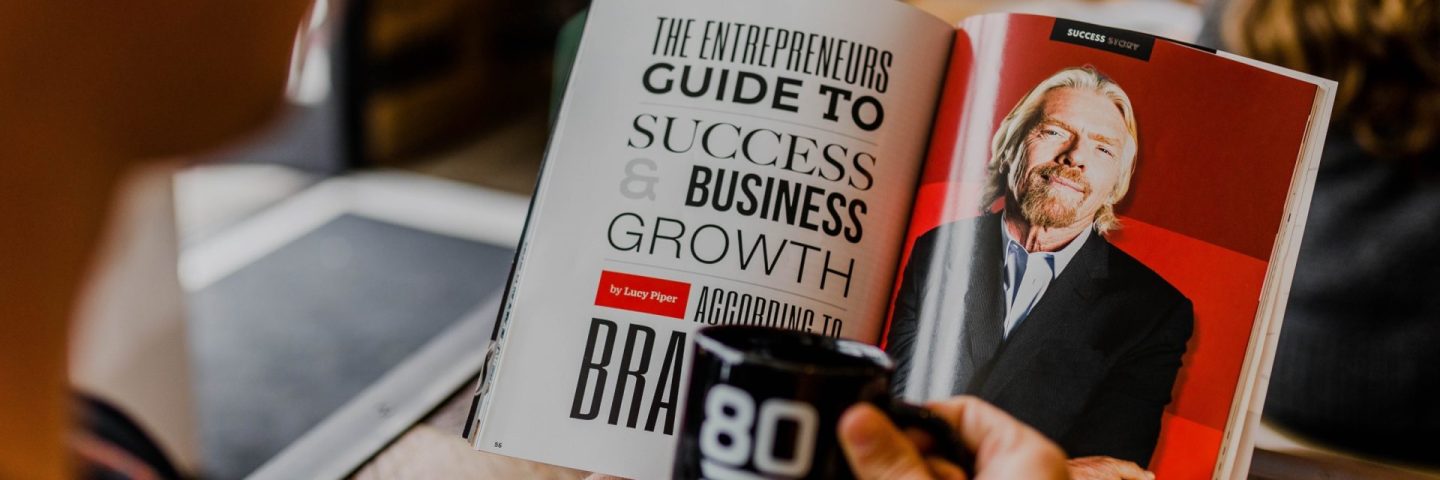
De Richard Branson methode
De scheidslijn tussen grootschalig zakelijk succes of een vroeg faillissement is soms maar een dun laagje vernis. Die oprechte bekentenis doet Richard Branson, excentriek entrepreneur en oprichter van het wereldberoemde Virgin-merk, bij vrijwel ieder interview waarin naar de aard van zijn succes wordt gevraagd. Soms moet je gewoon de mazzel hebben dat het je in de beginfase van je nieuwe onderneming net lang genoeg lukt om alle rekeningen te betalen. De successen van Branson zijn echter onmogelijk samen te vatten als een opeenstapeling van gelukjes. Achter het Virgin-imperium gaat wel degelijk een innovatieve denkwijze schuil: de Richard Branson methode.
Van frustratie naar businessmodel
We kunnen het ons in het Spotify-tijdperk nauwelijks nog voorstellen, maar er was een tijd waarin artiesten vrijwel niets verdienden aan concerten en het vooral van de verkoop van singles en albums moesten hebben. De echte muziekliefhebber besteedde grote delen van zijn maandelijkse inkomen aan peperdure lp’s die in menig huiskamer als trofeeën in boekenkasten tentoongesteld werden.
In die markt startte Richard Branson begin jaren zeventig zijn eerste bedrijfje: Virgin Records. De grootste frustratie op de platenmarkt was in die tijd de hoogte van de prijs van een lp. Door lp’s niet in winkels, maar via een postorder-concept te verkopen, wist Branson de prijs omlaag te brengen en albums betaalbaarder te maken. Het duurde niet lang voordat het bedrijf succesvol werd en – ironisch genoeg – een eerste winkel opende.
Dit businessmodel – nota bene het eerste model dat Branson ooit opzette – staat symbool voor het leeuwendeel van de bedrijven die hij in zijn imposante carrière startte. Branson kijkt scherp naar een markt of aanbieder, bijvoorbeeld de platenindustrie, en legt bloot waar het grootste frustratiepunt schuilt: in dit geval de kostprijs. Vervolgens heeft hij het lef om een businessmodel te bedenken waarin die frustratie wordt weggenomen.
Lef en vastberadenheid: Virgin Atlantic
Eén van de bekendste ondernemingen van Branson is ontegenzeggelijk Virgin Atlantic Airways. Toen hij 28 jaar was en op een Amerikaans vliegveld strandde op weg naar, jawel, de Virgin Islands, besloot hij dat het ook anders (lees: beter) kon. American Airlines annuleerde zijn vlucht en hij zou, samen met tientallen andere gedupeerden, een nacht op het vliegveld moeten doorbrengen.
Branson was dat niet van plan, wendde zich tot de charter-afdeling en deelde de prijs van het huren van een eigen vliegtuig door het aantal beschikbare stoelen. Hij keerde terug naar ‘zijn’ groep passagiers en vroeg wie er die avond voor 29 dollar alsnog naar de Virgin Islands wilde vliegen. Diezelfde avond landde Branson ‘gewoon’ nog op de Virgin Islands.
Het zette Branson uiteindelijk tot de oprichting van Virgin Atlantic, een luchtvaartmaatschappij waarmee Branson zijn eigen frustraties, zoals hij die had ervaren tijdens vluchten met andere maatschappijen, wilde oplossen. Met Virgin bood hij directe vluchten aan naar steden die anders moeilijk bereikbaar werden. Uiteraard lette hij op de prijs. Hij zorgde voor een prettige sfeer, onder meer door sympathiek personeel, fijne muziek tijdens het boarden en goede maaltijden aan boord. Daarnaast introduceerde hij een begrijpelijk puntensysteem voor frequent flyers, die hij daarmee aan zijn merk wist te binden.
Met alleen een goed product ging Branson het echter niet winnen in de luchtvaartbranche. De spijkerharde concurrentie – voornamelijk bestaande uit British Airways (BA) en American Airlines (AA) – moest aangepakt worden. Branson zette in de loop der jaren daarom kreten als “Mine’s bigger than yours”, “4 engines 4 longhaul” en “No Way BA/AA” – refererend aan een voorgenomen fusie tussen AA en BA – op de zijkant van zijn vliegtuigen. Continu verwees hij naar de concurrentiestrijd met vooral BA, en deed dat op een wijze die bij het grote publiek sympathie opwekte.

Volgens Richard Branson moet er binnen twaalf maanden winst worden gemaakt.
Binnen twaalf maanden winst
De managementstijl van Branson kent weinig wetten van Meden en Perzen. Hij heeft geen vast hoofdkantoor, doet niet aan vergaderen en heeft geen technische kennis over de producten of diensten die zijn bedrijven aanbieden. Branson onderneemt vanuit een overtuiging dat er in iedere branche behoefte is aan innovatie, en dat de partij die het beste innoveert, uiteindelijk aan het langste eind trekt.
Eén van zijn weinige regels is dat iedere onderneming binnen twaalf maanden succesvol moet zijn, anders trekt hij de stekker eruit. Virgin Atlantic schreef bijvoorbeeld binnen een jaar al zwarte cijfers – bijzonder voor een luchtvaartmaatschappij. Als je binnen een jaar nog geen succes boekt, zo redeneert Branson, dan is er iets mis met je product en word je niet de beste.
Wat is innovatie voor jou?
Om terug te komen op het begrip innovatie: bij Branson is dat een wijd begrip dat voor iedereen iets anders kan betekenen. Innovatie is dan ook toepasbaar op iedere branche en hoeft niet per se te betekenen dat je een geheel nieuw concept bedenkt. Veel marktleiders hebben de neiging stil te zitten en te weinig te innoveren; dat is waar Branson kansen ziet om de concurrentie te slim af te zijn door juist wel te innoveren en een markt proberen over te nemen.
Een mooi voorbeeld is Radio Free Virgin. Eind jaren negentig won het Internet aan populariteit onder het grote publiek en kwamen de eerste breedbandverbindingen beschikbaar. Mensen konden daarmee dag en nacht online zijn, maar er waren nog weinig toepassingen die dat vereisten. Branson zag de mogelijkheid die op dat vroege moment nog niemand zag: hij startte een platform – Radio Free Virgin – waar tientallen radiostations werden aangeboden als livestreams. Voor het eerst konden radioluisteraars op een laagdrempelige wijze stations van over de hele wereld hun huiskamer binnenhalen.
Volg niet de trend – Wees de trend
De trend volgen is, kortom, niet de innovator zijn. Volgens Branson zul je een trend zelf moeten starten. Zie verbetermogelijkheden in de wereld om je heen en laat je niet tegenhouden door een zogenaamd gebrek aan kennis van zaken. Branson wist niets van de luchtvaart toen hij op zijn 28e een vliegtuig huurde en welbeschouwd weet hij nu nog steeds niets van de luchtvaart. Maar hij weet wel welke innovaties er nodig zijn om het verschil te maken in iedere branche. Daarom is het geen toeval dat je in een Virgin-vliegtuig momenteel de beste WiFi tegen de mooiste prijs krijgt.
De volgende stap voor Branson: betaalbare ruimtereizen voor jou en mij. Met Virgin Galactic wil hij de ruimtevaart innoveren en een vlucht buiten de dampkring voor iedereen mogelijk maken. Dat klinkt wellicht ver weg, maar voor Branson is het gewoonweg de volgende logische innovatie in de ruimtevaartbranche.
Vraag jezelf continu af welke innovaties jouw branche ingrijpend zouden verbeteren, en zorg dat jij degene bent die die trend zet. Anders doet iemand anders het namelijk wel.



Reacties